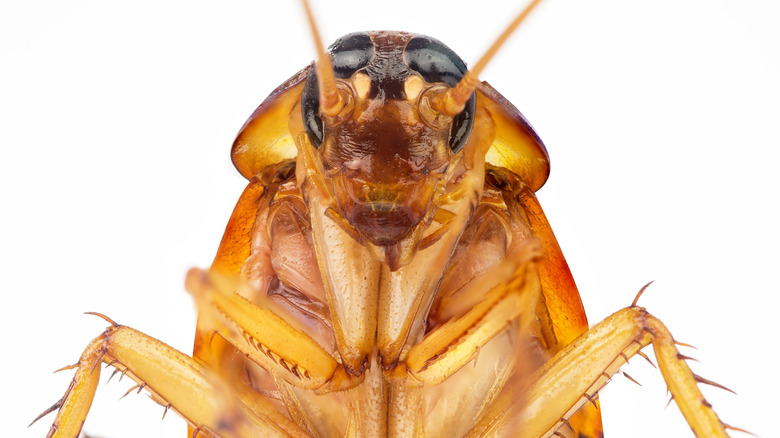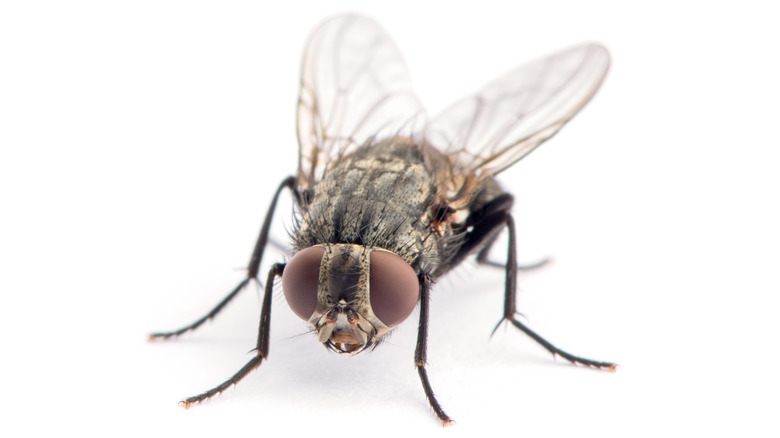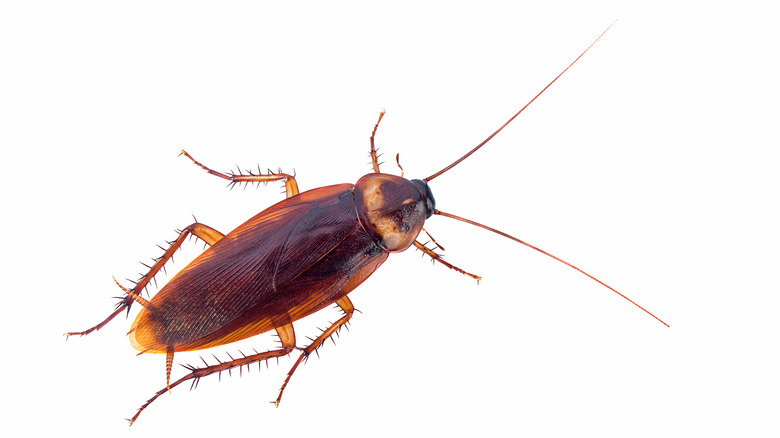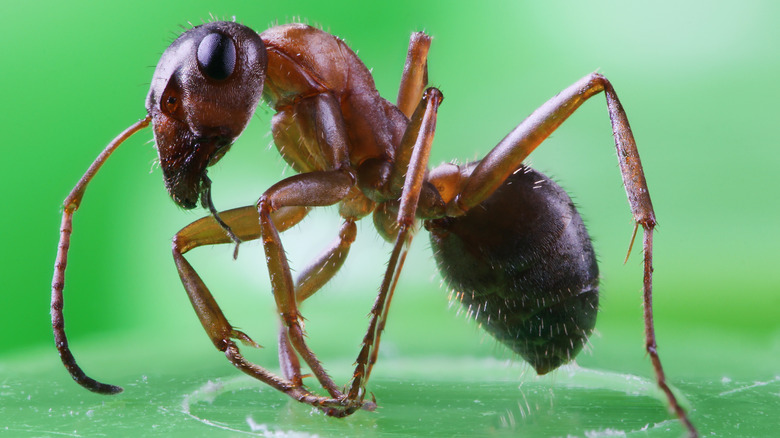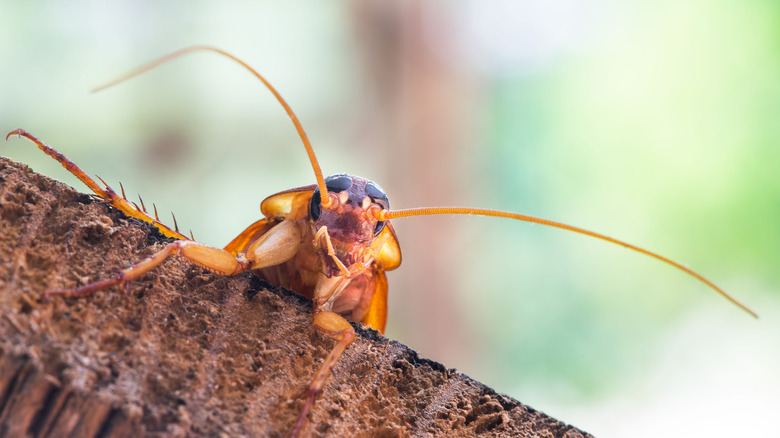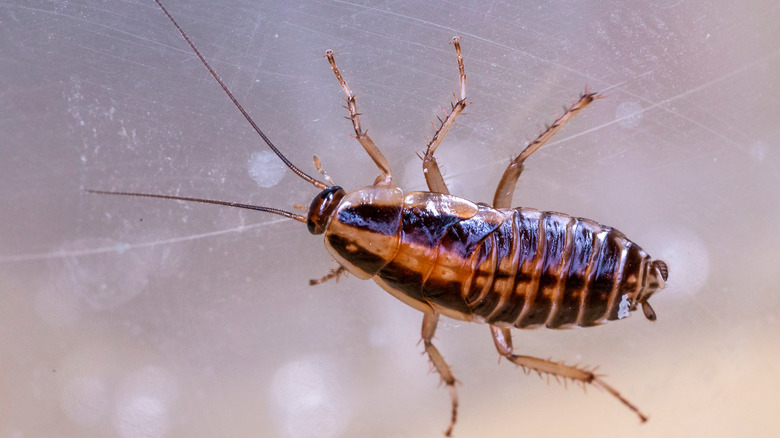Why Do Insects Spend So Much Time Grooming?
One big reason insects ick most of us out is because they're gross — as in, they live in and move through some really dirty environments. For this reason, it's easy to imagine why some insects might want to groom themselves. They are, however, just bugs, so maybe that's giving them too much credit. Why, then, do some insects do it? Recent research from academics in North Carolina and Russia reveal some reasons these six-legged creatures may spend so much time grooming. One explanation, though, is actually romantic, as Live Science explains.
Insects are certainly not the only living organisms that clean themselves. According to Pets on Mom, birds, primates, lions, and horses have all displayed the behavior, or have been known to socially clean one another. And let's not forget the mighty house cat's reputation for cleanliness. The big reasons why animals preen themselves or others remains much the same: to keep clean, too cool off, or to bond with a pack or a family (via Washington Post). The social dynamic seems less important for insects, but cleanliness certainly does play a part. Just not for the reason you might expect.
These insects have the best hygiene
But not all insects clean themselves. The research performed by scholars at North Carolina University and the Russian Academy of Sciences focused primarily on American cockroaches, but house flies and carpenter ants also engage in this behavior, as Smithsonian Magazine explains. The fact that scientists focused on the American Cockroach is not unexpected, as they live in and eat feces and garbage. They're also the largest of all house-dwelling roaches, and infestation is a problem all over the U.S.
For this reason, as well as the bug's association with derelict buildings and general squalor — not to mention the terrible stink they emit when they are squashed — cockroaches are generally thought of as pretty unclean, per BBC. But is this actually true? Cockroaches can carry disease, bacteria, or poisonous toxins from the environment, according to Cockroach Zone, which means they can be dangerous and should be avoided. But if cockroaches don't exactly clean for personal hygiene, then why do they do it?
How do insects groom themselves?
We've all seen our house cats clean themselves with their tongues twisted into all sorts of pretzel shapes to get at the hardest to reach places. That's not exactly how insects do it, but their approach is pretty similar. Instead of licking their bodies directly like cats, roaches insert their forelegs into their mouths and then clean their antennae. And they're pretty obsessive about it. Roaches, in fact, clean their antennae more or less nonstop, according to research (via Science Daily).
Like cockroaches, other insects known to clean themselves pay special attention to their antennae over other areas of their body. Antennae are an important part of how insects encounter their world, so it makes sense that they would be a focus while grooming. They use antennae to not only touch, interact, and navigate through their environment, but also use them to smell. And for the bugs beneath our feet, being able to detect scent is especially important for one very unexpected reason, as Science Direct explains.
Ungroomed antennae get covered in chemicals
Scientists discovered that by inserting their forelegs and then using them to wipe down their antennae, insects are actually cleaning off a number of chemicals that could otherwise impair the proper functioning of these important body parts, such as stearic acid and geranyl acetate (via Smithsonian Magazine). Per Science Daily, some of the chemicals cleaned off insect antennae are both volatile and non-volatile, meaning some have the ability to evaporate, while others don't (per Corrosionpedia). In other words, without cleaning the chemicals would otherwise stay in place.
What's more, some harmful chemicals come from the insect's environment, while others are produced within their own body. Unclean antennae disrupt the bug's olfactory system, and that's important for a number of reasons. A properly functioning olfactory system helps bugs find food and stay safe, among other behaviors. This varied functioning of an olfactory system based on cleanliness may also explain why some insecticides work better than others. But perhaps most importantly, a properly functioning olfactory system helps insects find a mate. Because there's no Match.com in the world of bugs, there are only sex pheromones.
Insects clean up nicely for their big date
When little insects and bugs are feeling amorous, they don't get dressed up nicely and go out for a drink, nor do they post a profile on Tinder. All that's left for them to do when partnering-up is release sex pheromones. These chemicals send a signal to others of their kind that someone's single and ready to mingle. If a bug can't smell those pheromones, then their perfect match might be missed. That's why they spend a lot of time keeping their pheromone-sensing organs — or antennae — especially clean, per Smithsonian Magazine.
Scientists discovered one final, fascinating reason cockroaches and other types of insects groom themselves: It helps them stay hydrated. No, bugs don't drink through their antennae. Instead, they clean their antennae to manage excess cuticular hydrocarbons, fatty molecules produced in their body which help manage their water retention and help prevent water loss. But without the ability to ask a cockroach why they're such neatniks, how did scientists reach these conclusions?
Some insects were forced to stay dirty
The manner in which these theories were tested was pretty simple: Some cockroaches were allowed to clean their antennae normally, while others were prevented from doing so, according to Smithsonian Magazine. Following that, the insects were exposed to pheromones and other environmental stimuli, and just as scientists suspected, the bugs with the clean antennae picked up the signals, while dirty-antennae left the other insects effectively blind.
Although the bulk of the research was on the American cockroach, and — though the method of cleaning varies somewhat between species — carpenter ants, houseflies, and even German cockroaches underwent similar experiments. The results were much the same, as Coby Schal, a scientist involved in the study, explained (via Science Daily). "The evidence is strong: Grooming is necessary to keep these foreign and native substances at a particular level," he said. "Leaving antennae dirty essentially blinds insects to their environment."
